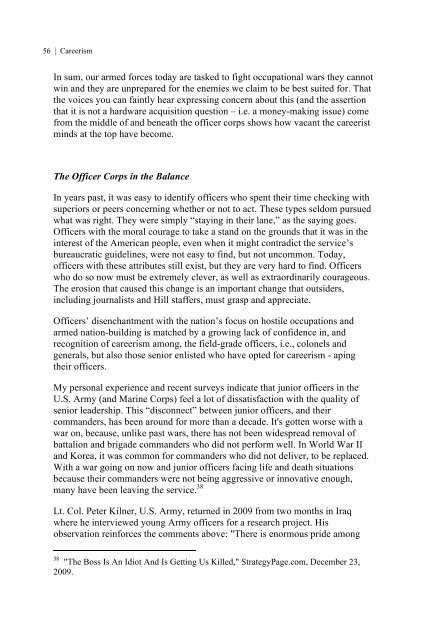Careerism
Careerism
Careerism
You also want an ePaper? Increase the reach of your titles
YUMPU automatically turns print PDFs into web optimized ePapers that Google loves.
56 | <strong>Careerism</strong><br />
In sum, our armed forces today are tasked to fight occupational wars they cannot<br />
win and they are unprepared for the enemies we claim to be best suited for. That<br />
the voices you can faintly hear expressing concern about this (and the assertion<br />
that it is not a hardware acquisition question – i.e. a money-making issue) come<br />
from the middle of and beneath the officer corps shows how vacant the careerist<br />
minds at the top have become.<br />
The Officer Corps in the Balance<br />
In years past, it was easy to identify officers who spent their time checking with<br />
superiors or peers concerning whether or not to act. These types seldom pursued<br />
what was right. They were simply “staying in their lane,” as the saying goes.<br />
Officers with the moral courage to take a stand on the grounds that it was in the<br />
interest of the American people, even when it might contradict the service’s<br />
bureaucratic guidelines, were not easy to find, but not uncommon. Today,<br />
officers with these attributes still exist, but they are very hard to find. Officers<br />
who do so now must be extremely clever, as well as extraordinarily courageous.<br />
The erosion that caused this change is an important change that outsiders,<br />
including journalists and Hill staffers, must grasp and appreciate.<br />
Officers’ disenchantment with the nation’s focus on hostile occupations and<br />
armed nation-building is matched by a growing lack of confidence in, and<br />
recognition of careerism among, the field-grade officers, i.e., colonels and<br />
generals, but also those senior enlisted who have opted for careerism - aping<br />
their officers.<br />
My personal experience and recent surveys indicate that junior officers in the<br />
U.S. Army (and Marine Corps) feel a lot of dissatisfaction with the quality of<br />
senior leadership. This “disconnect” between junior officers, and their<br />
commanders, has been around for more than a decade. It's gotten worse with a<br />
war on, because, unlike past wars, there has not been widespread removal of<br />
battalion and brigade commanders who did not perform well. In World War II<br />
and Korea, it was common for commanders who did not deliver, to be replaced.<br />
With a war going on now and junior officers facing life and death situations<br />
because their commanders were not being aggressive or innovative enough,<br />
many have been leaving the service. 38<br />
Lt. Col. Peter Kilner, U.S. Army, returned in 2009 from two months in Iraq<br />
where he interviewed young Army officers for a research project. His<br />
observation reinforces the comments above: "There is enormous pride among<br />
38 "The Boss Is An Idiot And Is Getting Us Killed," StrategyPage.com, December 23,<br />
2009.

















